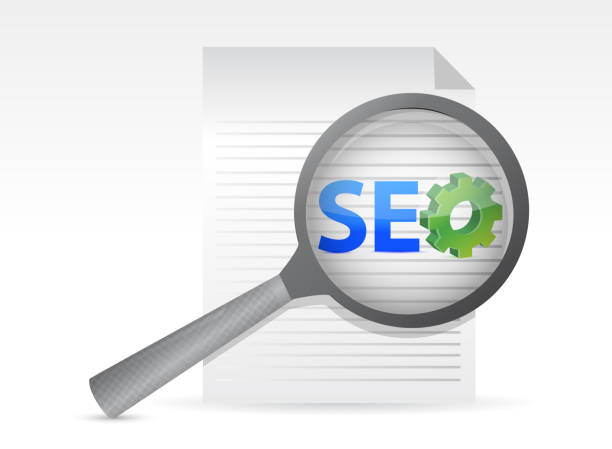What is SEO and why is it important?

What is SEO and why is it important?
#SEO (Search Engine Optimization) stands for Search Engine Optimization.
In simpler terms, SEO is a set of techniques and strategies that help you optimize your website for search engines like Google, Bing, and Yahoo.
The main goal of SEO is to increase your website’s ranking in search results (SERP), so that when users search for keywords related to your business, your website appears on the first pages of search results.
Why is SEO important? Suppose you have an online store that sells handmade products.
If your website ranks high in search results for keywords such as “buy handmade products” or “artistic products”, the likelihood that users will visit your website and buy from you will be much higher.
In fact, SEO is a cost-effective and sustainable marketing solution that can help you attract new customers, increase sales, and raise brand awareness.
The importance of SEO in today’s digital world is undeniable.
SEO helps you get seen among millions of other websites and reach your target customers.
Optimizing your site’s SEO helps you improve your site’s Alexa ranking.
Search engines like Google rank websites based on complex algorithms.
These algorithms consider various factors, including content quality, keyword relevance, website structure, page loading speed, user experience (UX), and many other factors.
SEO involves optimizing these factors to improve your website’s ranking in search results.
Thus, SEO is different from content marketing, social media marketing, and pay-per-click (PPC) advertising.
Is your online sales not as expected? With Rasawab, permanently solve the problem of low sales and poor user experience!
✅ Increase visitor-to-customer conversion rate
✅ Create an enjoyable user experience and increase customer trust
⚡ Act now to receive free consultation!
Key Concepts and Common Terms in SEO

Key Concepts and Common Terms in SEO
To better understand SEO and implement effective strategies, familiarity with the key concepts and terms in this field is essential.
Below, we will mention some of the most important of these concepts.
Keywords are words and phrases that users use to search for information in search engines.
Choosing appropriate and relevant keywords for your business is one of the most important steps in SEO.
Keywords can include main keywords and secondary keywords, whose identification is essential for SEO.
Ranking is your website’s position in search results for a specific keyword.
The higher your website’s ranking, the more likely users are to visit it.
Search Engine Results Page (SERP) is the page that the search engine displays after the user enters a keyword.
SERP includes organic (free) results and paid results (advertisements).
Link Building is the process of acquiring links from other websites to your website.
Link building is an important factor in ranking websites in search engines.
Internal link building is also very important and ensures that your site’s pages are connected to each other, allowing search engines to find your pages more easily.
Content is the information on your website, including text, images, videos, and other media.
High-quality content relevant to keywords is a key factor in SEO.
SEO suggests that content production is the best practice.
On-Page SEO is the optimization of elements within your website, such as page titles, meta descriptions, headings, images, and content.
On-page SEO helps search engines better understand the topic and content of your pages.
Off-Page SEO is the optimization of elements outside your website, such as link building, social media marketing, and branding.
Off-page SEO shows search engines that your website is authoritative and trustworthy.
User Experience (UX) is the overall experience and perception users have when visiting your website.
UX includes factors such as page loading speed, website design, ease of use, and accessibility.
Good user experience is an important factor in website ranking because websites that provide a good user experience are likely to attract and retain more visitors.
Keyword Research: Finding the Best Words for SEO

Keyword Research: Finding the Best Words for SEO
Keyword research is one of the most crucial steps in any SEO strategy.
The goal of keyword research is to find the words and phrases that your target audience uses to search for your products or services in search engines.
By identifying these keywords, you can optimize your website content to achieve a higher ranking in search results for those keywords.
Keyword Research Tools: Various tools are available for keyword research, including free and paid options.
Some of the most popular keyword research tools include:
- Google Keyword Planner
- SEMrush
- Ahrefs
- Moz Keyword Explorer
Keyword Selection Criteria: When choosing keywords, you should pay attention to the following criteria:
- Relevance: Keywords should be relevant to your products or services.
- Search Volume: Keywords should have a high search volume, meaning many people are searching for these keywords in search engines.
- Competition: Keywords should not have very high competition, meaning many websites are optimized for these keywords.
Types of Keywords: Keywords can be divided into various types, including:
- Broad Keywords (Main Keywords): General and broad keywords with high search volume.
- Long-tail Keywords: Specific and longer keywords with lower search volume but higher conversion rates.
To select suitable keywords, you should consider a combination of broad keywords and long-tail keywords.
Broad keywords help you attract more traffic to your website, while long-tail keywords help you attract more targeted traffic.
| Tool | Cost | Features |
|---|---|---|
| Google Keyword Planner | Free | Keyword research, competitor analysis |
| SEMrush | Paid | Keyword research, competitor analysis, rank tracking |
| Ahrefs | Paid | Keyword research, competitor analysis, backlink analysis |
On-Page SEO: Optimizing Website Content

On-Page SEO: Optimizing Website Content
On-page SEO involves optimizing all elements present on your website pages.
These elements include the following:
- Title Tag: The page title is the most important element of on-page SEO.
The page title should be concise and relevant to the page’s content and include the page’s main keyword. - Meta Description: The meta description is a summary of the page’s content that is displayed in search results.
The meta description should be engaging and persuasive and include the page’s main keyword. - Headings: Headings are used to organize page content.
Headings should be clear and concise and include keywords relevant to the page’s content. - Images: Images should be optimized to have a small file size and increase page loading speed.
Images should have alternative text (Alt Text) that describes the image content. - Content: Content should be high-quality, relevant, and unique.
Content should include keywords related to the page’s topic, but keyword stuffing should be avoided.
In addition to these, you should also pay attention to the URL structure of your website pages.
URLs should be short, readable, and include keywords relevant to the page’s topic.
The site structure should also be such that users can easily navigate your site and find the pages they are looking for.
On-page SEO can easily help you rank number one on Google.
Are visitors leaving your e-commerce site before making a purchase? Don’t worry anymore! With Rasawab’s professional e-commerce website design services, permanently solve the problem of low visitor-to-customer conversion!
✅ Significant increase in conversion rates and sales
✅ Unparalleled and engaging user experience
⚡ Contact us now for a free consultation!
Off-Page SEO: Increasing Website Authority Through Link Building

Off-Page SEO: Increasing Website Authority Through Link Building
Off-page SEO includes all actions you take to increase your website’s authority outside your website.
One of the most important off-page SEO factors is link building.
Link building is the process of receiving links from other websites to your website.
Links are like votes that other websites give to your website.
The more links you receive from reputable and relevant websites, the more authoritative your website will become in the eyes of search engines.
Link Building Methods: There are various methods for link building, including:
- Creating High-Quality Content: Creating high-quality and valuable content is the best way to attract natural links.
If your content is useful and engaging, other websites will link to it. - Link Exchange: Exchanging links with relevant and authoritative websites can help you acquire more links.
- Participation in Forums and Blogs: Participating in forums and blogs related to your field of work and providing valuable comments can help you acquire more links.
- Social Media Activity: Being active on social media and sharing your content can help you attract more traffic to your website and acquire more links.
Important Link Building Tips: When building links, you should pay attention to the following points:
- Link Quality: High-quality links from authoritative and relevant websites have more value.
- Link Diversity: You should acquire links from various sources.
- Anchor Text: The anchor text should be relevant to the content of the page you are linking to.
Proper link building helps you improve your #SEO position and achieve a better ranking on Google.
User Experience (UX) and its Impact on SEO

User Experience (UX) and its Impact on SEO
User Experience (UX) refers to users’ feelings and perceptions of your website.
A website with good user experience allows users to easily navigate your website, find the information they need, and enjoy your website’s content.
Google and other search engines place great importance on user experience.
Websites that provide a good user experience achieve higher rankings in search results.
Factors Affecting User Experience: Various factors influence user experience, including:
- Page Loading Speed: Page loading speed is one of the most important factors influencing user experience.
Users expect your website pages to load quickly.
If your website pages load slowly, users may leave your website and go to other websites. - Website Design: Website design should be attractive, user-friendly, and professional.
The website design should allow users to easily navigate your website and find the information they need. - Usability: Your website should be easy to use.
Users should be able to easily navigate your website, fill out forms, and interact with other elements of your website. - Content: Your website content should be high-quality, relevant, and engaging.
Content should be such that it attracts users and encourages them to stay on your website. - Mobile Compatibility: Your website should be compatible with mobile devices.
Today, many users access the internet via mobile devices.
If your website is not compatible with mobile devices, these users may leave your website.
To improve your website’s user experience, you can use various tools such as Google Analytics and Hotjar.
These tools help you analyze user behavior on your website and identify your website’s weaknesses.
SEO and user experience are two sides of the same coin.
Technical SEO: Optimizing Website Infrastructure
![]()
Technical SEO: Optimizing Website Infrastructure
Technical SEO focuses on optimizing the technical aspects of your website so that search engines can easily crawl and index your website.
Technical SEO is a crucial part of SEO, because if search engines cannot properly crawl and index your website, your website will not appear in search results.
Important Factors in Technical SEO:
- Website Speed: Website speed is one of the most important factors in technical SEO.
Websites that load quickly provide a better user experience and achieve higher rankings in search results. - Mobile Compatibility: Your website should be compatible with mobile devices.
- XML Sitemap: An XML sitemap is a file that contains a list of all your website’s pages.
An XML sitemap helps search engines fully crawl your website. - Robots.txt File: The Robots.txt file is a file that tells search engines which pages of your website not to crawl.
- SSL Certificate: An SSL certificate is a security certificate that indicates your website uses a secure connection.
- URL Structure: Your website’s URL structure should be logical and user-friendly.
URLs should be short, readable, and include keywords relevant to the page’s topic.
| Factor | Description | Importance |
|---|---|---|
| Site Speed | Page loading speed | Very high |
| Mobile Compatibility | Site responsiveness on mobile | Very high |
| XML Sitemap | A file to introduce pages to search engines | High |
| SSL Certificate | Site security | Medium |
To improve your website’s technical SEO, you can use various tools such as Google Search Console and GTmetrix.
These tools help you identify and resolve your website’s technical issues.
One of the most important tasks for technical SEO is improving site speed.
Competitor Analysis in SEO

Competitor Analysis in SEO
Competitor analysis is one of the most important parts of any SEO strategy.
By analyzing competitors, you can identify their strengths and weaknesses and use them to improve your own SEO strategy.
Competitor analysis in SEO helps you adopt a correct strategy for improving your SEO.
How to Analyze Competitors?
- Identifying Competitors: First, you need to identify your competitors.
You can use search engines to find websites that rank for keywords similar to yours. - Analyzing Competitor Websites: After identifying competitors, you need to analyze their websites.
Pay attention to the following: - Keywords for which competitors rank
- Competitor website content
- Competitor link-building strategy
- Competitor website user experience
- Using Competitor Analysis Tools: Various tools are available for competitor analysis, including SEMrush, Ahrefs, and Moz.
These tools help you obtain accurate information about competitor websites.
What Information Should We Collect?
- Keywords: The keywords for which competitors rank indicate what topics competitors have focused on.
- Content: Competitor website content shows what type of content competitors produce and what value they offer to users.
- Links: The links competitors have received from other websites indicate how authoritative competitors are.
- Social Media: Competitors’ presence on social media shows how competitors interact with their audience.
How to Use the Collected Information?
- Identifying Opportunities: By analyzing competitors, you can identify opportunities to improve your SEO strategy.
For example, you might realize that competitors have not focused on a specific keyword. - Improving Content: By examining competitor content, you can produce better content.
- Improving Link Building Strategy: By examining competitor link building strategies, you can acquire more links.
- Improving User Experience: By examining competitor website user experience, you can improve your own website’s user experience.
Are you bothered by losing customers who visited your site to buy?
Rasawab is your specialized solution for having a successful online store.
✅ Significant increase in your online sales
✅ Building trust and professional branding with customers⚡ Get free consultation from Rasawab specialists!
Measuring and Tracking SEO Results

Measuring and Tracking SEO Results
Measuring and tracking SEO results is essential for understanding the effectiveness of your SEO strategy and making necessary changes.
Without measuring and tracking results, you cannot know whether your SEO efforts are yielding results or not.
To better understand your #SEO strategy, it is necessary to constantly monitor its results.
Which Metrics Should We Measure?
- Organic Traffic: Organic traffic is traffic that comes to your website from search engines.
An increase in organic traffic indicates that your SEO strategy is effective. - Keyword Rankings: Keyword rankings show what position your website holds for various keywords in search results.
Improvement in keyword rankings indicates that your website is gaining more visibility. - Conversion Rate: Conversion rate shows what percentage of your website visitors convert into customers.
An increase in conversion rate indicates that your website is attracting more customers. - Bounce Rate: Bounce rate shows what percentage of your website visitors leave your website after viewing one page.
A decrease in bounce rate indicates that your website has become more engaging. - Time on Page: Time on page shows how much time visitors spend on each page of your website.
An increase in time on page indicates that your website content has become more engaging.
Tools for Measuring and Tracking SEO Results:
- Google Analytics: Google Analytics is a free tool that helps you track your website traffic.
- Google Search Console: Google Search Console is a free tool that helps you track your website’s performance in search results.
- SEMrush: SEMrush is a paid tool that helps you track your keyword rankings and analyze your competitors.
How to Use the Collected Information?
- Identifying Strengths and Weaknesses: By measuring and tracking SEO results, you can identify the strengths and weaknesses of your SEO strategy.
- Making Necessary Changes: Using the collected information, you can make necessary changes to your SEO strategy.
- Continuous Improvement: SEO is an ongoing process.
You should continuously measure and track your SEO results and improve your SEO strategy based on the collected information.
The Future of SEO and New Trends

The Future of SEO and New Trends
SEO is a dynamic field that is constantly changing.
With technological advancements and evolving user behavior, new trends are emerging in SEO.
To succeed in SEO, you must be aware of new trends and adjust your SEO strategy accordingly.
New Trends in SEO:
- Artificial Intelligence (AI): AI is changing SEO.
Search engines use AI to better understand content and provide more relevant search results to users. - Voice Search: With the increasing use of voice devices like Google Home and Amazon Echo, voice search is becoming a popular method for searching for information.
- Video Marketing: Video marketing is an effective way to attract audiences and improve SEO rankings.
- Mobile-First: With the increasing use of mobile devices, search engines prioritize websites that are optimized for mobile devices.
- User Experience (UX): User experience is an important factor in SEO rankings.
Search engines prioritize websites that offer a good user experience.
How to Prepare for the Future of SEO?
- Continuous Learning: SEO is a complex field that requires continuous learning.
You should constantly study new SEO trends and keep your knowledge up to date. - Trial and Error: The best way to learn SEO is through trial and error.
You should test various SEO strategies and see which ones yield the best results for you. - Using SEO Tools: Various SEO tools are available to help you improve your SEO strategy.
You should use these tools to achieve better results. - Focus on User Experience: User experience is an important factor in SEO.
You should focus on providing a good user experience to improve your website’s ranking in search results.
In summary, SEO is an ongoing process that requires continuous learning, trial and error, and a focus on user experience.
By following new trends and using SEO tools, you can improve your website’s ranking in search results and attract more traffic to your website.
Frequently Asked Questions
| Question | Answer |
|---|---|
| What is SEO? | SEO, or Search Engine Optimization, is the process of increasing the quality and quantity of website traffic by improving site ranking in natural (organic) search engine results like Google. |
| What are the main types of SEO? | SEO is divided into three main categories: On-Page SEO, Off-Page SEO, and Technical SEO. |
| What does On-Page SEO include? | On-Page SEO involves optimizing elements within the website, such as keywords, title tags, meta descriptions, content, URL structure, images, and internal links. |
| What is Off-Page SEO? | Off-Page SEO refers to activities outside the website that help improve its ranking, such as backlink building, social media marketing, and brand mentions. |
| What is Technical SEO? | Technical SEO focuses on optimizing the technical aspects of a website to help search engines crawl and index it better. This includes site speed, mobile-friendliness, site structure, sitemaps, and the Robots.txt file. |
| What role do Keywords play in SEO? | Keywords are phrases that users enter into search engines. Proper and targeted use of relevant keywords in content and site elements helps search engines understand your page’s topic and display it for relevant searches. |
| What is a Backlink and why is it important? | A backlink, or inbound link, is a link from one website to another. Backlinks act as a “vote of confidence” from other sites for search engines and play an important role in the authority and ranking improvement of a site, especially if they are from reputable sites. |
| What impact does quality content have on SEO? | Quality, relevant, comprehensive, and unique content not only attracts and retains users but also shows search engines that your page is valuable. This helps improve rankings, reduce bounce rates, and increase user time on site. |
| Why is website loading speed important for SEO? | Website loading speed is an important ranking factor for Google. Faster sites provide a better user experience, have lower bounce rates, and are preferred by search engines. |
| Is SEO a one-time process? | No, SEO is a continuous and long-term process. Search engine algorithms are constantly changing, competition is increasing, and website content also needs updates. Therefore, SEO requires continuous monitoring, analysis, and optimization. |
And other advertising services from Rasaweb Advertising Agency:
- Smart Customer Journey Map: A quick and efficient solution for campaign management, focusing on custom programming.
- Smart Advertorial: A blend of creativity and technology for digital branding through intelligent data analysis.
- Smart Website Development: A professional solution for customer acquisition, focusing on using real data.
- Smart Social Media: An effective tool for online growth with precise audience targeting.
- Smart UI/UX: A quick and efficient solution for customer behavior analysis, focusing on Google Ads management.
And more than hundreds of other services in the field of internet advertising, advertising consultation, and organizational solutions.
Internet Advertising | Advertising Strategy | Advertorials
Sources
Content SEO on Aparat
What is Content SEO and How to Do It?
Comprehensive Content SEO Guide
The Importance of Content SEO on a Website
? Is your business ready to soar to success? Rasaweb Afarin Digital Marketing Agency paves the way for your brand’s growth and prominence by offering comprehensive and professional services, including modern and user-friendly e-commerce website design, targeted digital marketing strategies, and specialized SEO.
📍 Tehran, Mirdamad Street, next to Bank Markazi, Southern Kazeroon Alley, Ramin Alley, No. 6


